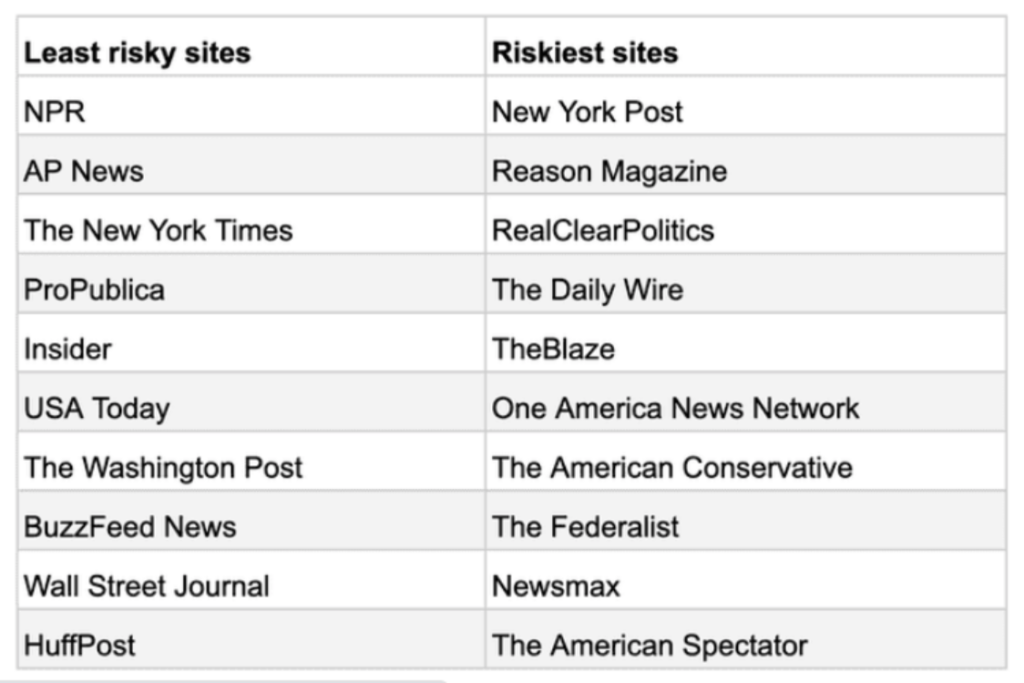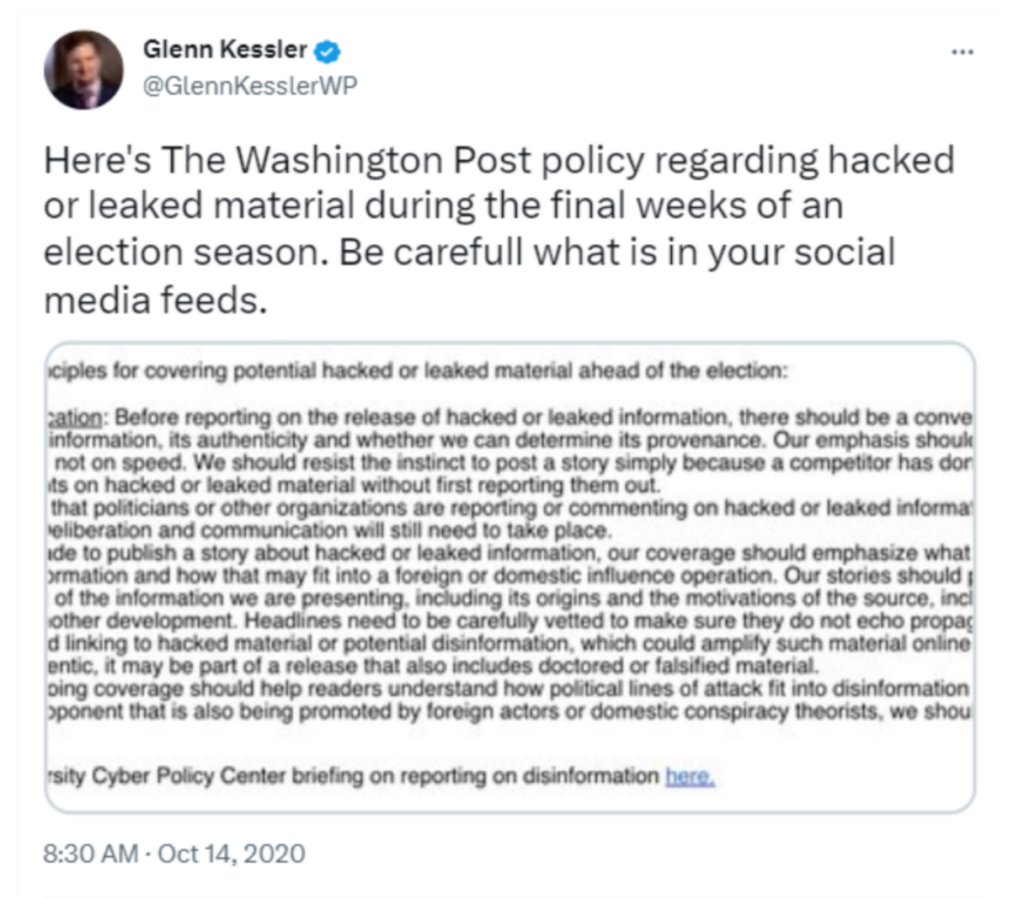Conservative News Sites Aren’t ‘Risky,’ A ‘Disinformation Index’ To Censor Speech Is
“To reduce disinformation, we need to remove the financial incentive to create it,” the Global Disinformation Index declares on its mission page. But as the Washington Examiner exposed last week, the self-appointed arbiter of truth doesn’t seek to silence the legacy corporate outlets that repeatedly peddled false stories. Rather, it demands the widespread censorship of conservative webpages that got those stories correct by branding the right-leaning sites the “riskiest” ones when it comes to “disinformation.”
It is not conservative new outlets that are “risky,” however. And it isn’t even “disinformation” that’s risky: Disinformation — whatever that means — can be countered with the truth. What is risky is the growing belief that experts can both dictate what is deceptive and declare that such speech should be censored.
A simple graphic from the GDI’s summary of its “Disinformation Risk in the United States Online Media Market,” crystalizes the implications of the censorship approach pushed by GDI by establishing that if the outlets GDI seeks to silence were muted, the public would remain ignorant about important questions of national security, government malfeasance, corruption, and major policy matters.

Compare, for instance, the first two media outlets GDI identifies as the “least risky sites” and “riskiest sites” — NPR and the New York Post, respectively — and their coverage of the Hunter Biden laptop story. The New York Post not only broke the story but provided a detailed analysis of material recovered from the abandoned MacBook that implicated then-presidential candidate Joe Biden in a pay-to-play scandal.
In contrast, NPR declared on Twitter it was not covering the Hunter Biden story because “we don’t want to waste our time on stories that are not really stories, and we don’t want to waste the listeners’ and readers’ time on stories that are just pure distractions.” NPR’s failure to initially cover the story caused the government-funded outlet to remain ignorant of the basic facts, prompting NPR to later falsely report that the documents recovered from Hunter Biden’s laptop had been “discredited by U.S. intelligence.” NPR later issued a correction on that disinformation.
In general, the outlets on the left — both politically and in GDI’s graphic — either ignored the Biden family scandal or spun the story as representing Russian disinformation, with The Washington Post’s so-called fact-checker even framing the New York Post’s breaking news inaccurately as “hacked or leaked material.” The “riskiest sites,” in contrast, reported the story and dug deeper for corroborating information.

In addition to the corporate legacy outlets limiting their reporting on the materials contained on the abandoned laptop that suggested Joe Biden profited from Hunter’s foreign business ventures, Twitter censored the story, and Facebook limited visibility of the scandal. Such censorship had serious consequences: Half of the respondents who were surveyed after Twitter’s new owner, Elon Musk, revealed the details behind the efforts to block the New York Post story said they would have voted differently had they known the revelations about the Biden family were authentic.
Since the election, several of the legacy outlets that had refused to cover the laptop story have acknowledged the authenticity of the laptop, albeit more than a year after voters cast their ballots for president in 2020. But without the New York Post’s original coverage, The New York Times and the other supposed standard-bearers of journalism never would have covered the story. The American public and Congressional Oversight Committee would have also remained ignorant of the serious national security risk and apparent Biden family corruption.
That is precisely the future awaiting America and the world if GDI succeeds in its mission, with the organization promising to “cut off disinformation ad revenue streams enabling its redirection to higher quality news.” And how does GDI seek to demonetize and destroy media outlets? The British-based company brags that “ad techs” use its data to “divert money away from disinforming domains.” “Advertisers” rely on GDI’s “trusted risk rating” in placing advertisements, and “platforms and search engines,” “incorporate risk signal into their products and trust and safety teams.”
The New York Post’s coverage of the Hunter Biden story represents but one of many important stories covered accurately by the “riskiest sites,” in contrast to the false reporting and narratives spread by those outlets deemed the “least risky sites.” The Russia-collusion hoax and the Justice Department and FBI’s abuse of the FISA Court system to unconstitutionally surveil the innocent American and CIA source Carter Page provide the most expansive illustration of the inaccurate reporting peddled by The New York Times, The Washington Post, USA Today, and the other sites GDI deems providers of “higher quality news.”
Not only did those outlets get the story wrong, but in the case of USA Today — when provided a detailed analysis exposing the Russia-collusion hoax, supported by original source documentation — the outlet refused to publish the truth. That’s because it, like the GDI, branded The Federalist, which was cited in support of the editorial the newspaper had preliminarily approved, “not reliable.” But as the inspector general’s report would later confirm, both the proposed editorial and the underlying articles published at The Federalist were 100 percent accurate.
So if the GDI has its way and The Federalist is silenced, the truth will be too, as USA Today and other herd-following outlets will refuse to publish important stories that run against the grain of the narratives pushed by the “least risky sites.”
Who then will expose the false narratives peddled by those “least risky sites,” such as The New York Times, which began running a preemptive hit on former Attorney General William Barr and Special Counsel John Durham in anticipation of a likely damaging report on the DOJ and FBI’s malfeasance in their investigation into Donald Trump? Among the many misleading and illogical charges against Barr and Durham was the Times’ blatantly false representation that the two men had inappropriately discussed Durham’s investigation. Americans didn’t see the other “least risky sites” analyze the special counsel regulations, which, had they done so, would have established that the Times’ accusation of impropriety was unfounded. The Federalist did though.
The Federalist also dug further to discover the client represented by the lawyer the Times relied upon to attack Barr and Durham. Lo and behold, the unnamed client was none other than one of the chief participants in the Russia-collusion hoax: Stefan Halper. Relying on the spin of Halper’s lawyer over the former attorney general and a well-respected former U.S. attorney sure seems a risky move for the Old Gray Lady!
Time and again, the supposedly less risky outlets pushed false narratives, whether about Brett Kavanaugh during his confirmation battle, Justice Clarence Thomas’ wife and nonexistent conflicts of interest, or Devin Nunes and his battle to expose FISA abuse.
The origins of Covid, the inability of the Covid shot to prevent transmission of the virus, the lack of efficacy of cloth masks, and the predictable harm of masks and lockdowns on children — these were all things the “riskiest sites” got right while the “less risky” ones botched the stories. Likewise, while the “higher quality news sites” continue to proclaim that males can become female and vice versa, the sites GDI seeks to bankrupt highlight the science and the harm the trans ideology imposes most devastatingly on children.
The GDI doesn’t seek to prevent disinformation; it seeks to censor accurate information. That’s what is truly risky.
Margot Cleveland is The Federalist’s senior legal correspondent. She is also a contributor to National Review Online, the Washington Examiner, Aleteia, and Townhall.com, and has been published in the Wall Street Journal and USA Today. Cleveland is a lawyer and a graduate of the Notre Dame Law School, where she earned the Hoynes Prize—the law school’s highest honor. She later served for nearly 25 years as a permanent law clerk for a federal appellate judge on the Seventh Circuit Court of Appeals. Cleveland is a former full-time university faculty member and now teaches as an adjunct from time to time. As a stay-at-home homeschooling mom of a young son with cystic fibrosis, Cleveland frequently writes on cultural issues related to parenting and special-needs children. Cleveland is on Twitter at @ProfMJCleveland. The views expressed here are those of Cleveland in her private capacity.





Comments are closed.